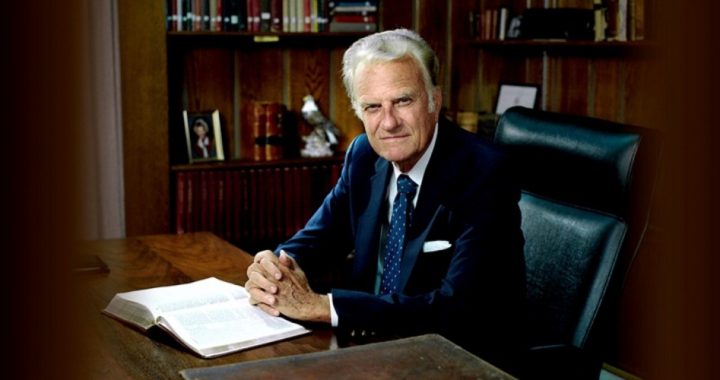
Billy Graham, the North Carolina farm boy who became the 20th century’s most high-profile and beloved Protestant evangelical messenger, died February 21 at the age of 99.
After graduating in 1943 from Wheaton College in Illinois, Graham served as a church pastor until shortly after the end of World War II, when he began traveling across the United States and into Europe, gaining fame as a Protestant evangelist.
But it was his famed 1949 Los Angeles crusade that gave Graham the recognition and favor that was to cover his ministry for the rest of his life, as newspaper baron William Randolph Hearst ordered his editors to “puff Graham” — to give him nothing but favorable press — which resulted in overwhelming positive coverage for Graham across America.
In 1950 Graham founded the Billy Graham Evangelistic Association, and over the next 60 years he, along with a team that included popular soloist George Beverly Shea and often featured noted Christian celebrities, held capacity-crowd gospel events in nearly every major American city, as well as scores of locales throughout the world. As a result of those crusades, along with his television and radio programs, millions of individuals professed faith in Christ.
While Graham enjoyed a measure of public esteem seldom experienced by conservative Christian leaders, he was not without criticism. As reported by Christianity Today, “some liberals and intellectuals called his message ‘simplistic,’” and “some fundamentalists considered him ‘compromised’ for cooperating with mainline groups and the National Council of Churches.”
And as civil rights took center stage in the late 1950s, “white segregationists were furious when he invited the ‘agitator’ Martin Luther King Jr. to pray at the 1957 New York City crusade,” recalled Christianity Today. On the other hand, “civil rights activists accused him of cowardice for not joining them on protest marches and getting arrested for the cause.”
And in 1982, when the communist government of the USSR invited Graham to preach in the Soviet Union, he was deeply criticized for claiming that he “had not personally seen any evidence of religious persecution.” While some accused him of being a traitor, reported Christianity Today, “he insisted he would go anywhere to preach as long as there were no restrictions on his freedom to proclaim the gospel. He returned claiming he saw the hand of God working in the Soviet Union. He was fiercely attacked for being naïve and ‘a tool of the Soviet propaganda machine.’”
Additionally, Reuters recalled that “Graham found himself at times in controversy over his disapproving stand on gay rights, as well as a over a secretly recorded conversation with Nixon in which the cleric complained that Jews had too much influence on the U.S. media.”
Few today remember such controversies, recalling instead that throughout his career he was a personal confidant to U.S. presidents, world leaders, Catholic popes, celebrities, and other notable individuals in nearly every realm of influence.
However, what he may most be remembered for was his ability to connect with everyday people, inspiring their admiration and esteem. Between 1950 and 1990, Graham appeared on Gallup’s “Most Admired” list more than any other American. Later in his career he received both the Presidential Medal of Freedom (from President Regan in 1983) and the Congressional Gold Medal (shared with his wife, Ruth Bell Graham).
In 2001, Queen Elizabeth II made Graham an honorary Knight Commander of the British Empire, and in 2013 the people of his home state of North Carolina named him their “Favorite Son” through a unanimous vote of the state’s General Assembly.
Among those offering statements on Graham’s death were President Trump, who said that “there was nobody like him. He will be missed by Christians and all religions. A very special man.”
Vice President Mike Pence said that “Billy Graham’s ministry for the gospel of Jesus Christ and his matchless voice changed the lives of millions. We mourn his passing, but I know with absolute certainty that today he heard those words, ‘well done good and faithful servant.’”
Former President George H.W. Bush recalled that Billy Graham’s “faith in Christ and his totally honest evangelical spirit inspired people across the country and around the world. I think Billy touched the hearts of not only Christians, but people of all faiths, because he was such a good man. I was privileged to have him as a personal friend.”
Former President George W. Bush called Graham a “consequential leader” possessed of a “powerful, captivating presence and a keen mind. He was full of kindness and grace. His love for Christ and his gentle soul helped open hearts to the Word, including mine.”
Former President Jimmy Carter said that Graham “shaped the spiritual lives of tens of millions of people worldwide. Broad-minded, forgiving, and humble in his treatment of others, he exemplified the life of Jesus Christ by constantly reaching out for opportunities to serve.”
And former President Bill Clinton said that “Billy has finished his long good race, leaving our world a better place and claiming his place in glory.”
It is estimated that Billy Graham presented the evangelical gospel message to more people than anyone else in history, with an estimated three million-plus individuals responding to his invitation to “accept Jesus into your heart” at the end of his messages.
Upon Graham’s passing, his son Franklin, who took the reins of the Billy Graham Evangelistic Association in 2005, announced that his father had “departed this world into eternal life in Heaven, prepared by the Lord Jesus Christ — the Savior of the world — whom he proclaimed for nearly 80 years. He will be missed by our family, his colleagues, faithful ministry partners, and, yes, many around the world. But what joy he has to be welcomed by God the Father, and be reunited with my mother in the presence of Jesus who speaks peace to eternal souls.”
Photo: Courtesy of Billy Graham Evangelistic Association



